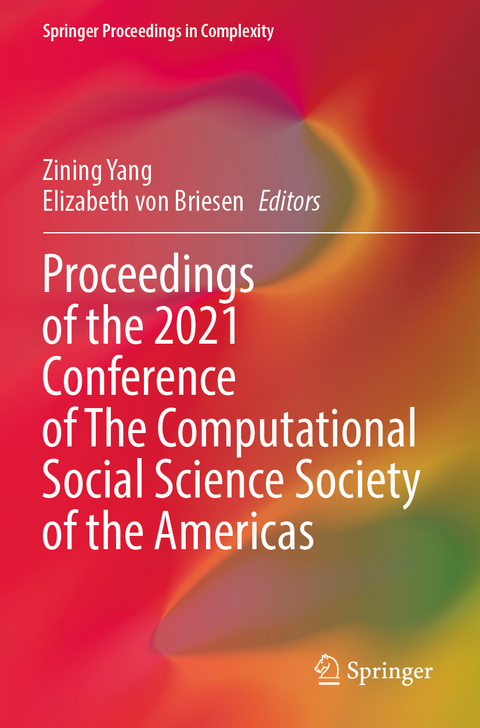
Proceedings of the 2021 Conference of The Computational Social Science Society of the Americas
Springer International Publishing (Verlag)
978-3-030-96190-9 (ISBN)
This book contains a selection of the latest research in the field of Computational Social Science (CSS) methods, uses, and results, as presented at the 2021 annual conference of the Computational Social Science Society of the Americas (CSSSA). Computational social science (CSS) is the science that investigates social and behavioral dynamics through social simulation, social network analysis, and social media analysis.
The CSSSA is a professional society that aims to advance the field of computational social science in all areas, including basic and applied orientations, by holding conferences and workshops, promoting standards of scientific excellence in research and teaching, and publishing research findings and results.
lt;p>Dr. Zining Yang is Senior Manager at Southern California Edison. She also works as Adjunct Professor at California State Polytechnic University in Pomona and Associate Director at the TransResearch Consortium. She sits on the Board of the Computational Social Science Society of the Americas (CSSSA) and serves as Scientific Advisory Board Member for Human Factors and Simulations. She received her Ph.D. in Computational and Applied Mathematics and Political Economy from Claremont Graduate University in 2015.
Her research interests include Data analytics, machine learning, modeling and simulation, complex adaptive systems, agent-based models, and network analysis. She has been published numerous times in the fields of computer science, economics, public policy, and political science. She has been identified as an outstanding researcher by the government, worked on a National Science Foundation-sponsored project, and won multiple awards from various organizations, including the Ministry of Education of the Peoples Republic of China; International Social Computing, Behavioral Modeling and Prediction; and the International Institute of Informatics and Systemics.
Dr. Elizabeth von Briesen is Assistant Professor of Computer Science at Elon University and is Member of the Board of the Computational Social Science Society of the Americas. She received her Ph.D. in Computing & Informatics from the University of North Carolina at Charlotte in 2020. Her research interests are focused on the study of complex adaptive systems using computational techniques, particularly with respect to social systems experiencing identity-based conflict. She primarily works with agent-based models and performs data mining and sentiment analysis to inform those simulations. Finally, in her current position, she strives to contribute toward an evolving undergraduate computer science experience through research, service, and high-quality, innovative teaching.
Chapter 1 - Effects of Assortativity on Consensus Formation with Heterogeneous Agents (Ece Mutlu and Ozlem Ozmen Garibay).- Chapter 2 - Quantifying Polish Anti-Semitism in Twitter: A Robust Unsupervised Approach with Signal Processing (Peter Chew).- Chapter 3 - On Modeling Evolution in Continuous Spaces (Robin Clark and Steven Kimbrough).- Chapter 4 - Economic Sanctions and Consumer Behavior in Target States: An Agent-Based Model of Boycott Movements (Rena Sung and Jonghyuk Park).- Chapter 5 - Scheduler dependencies in Agent-Based Models: A case-study using a contagion model (Srikanth Mudigonda; Santiago Nunez-Corrales; Rajesh Venkatachalapathy and Jeffrey Graham).- Chapter 6 - Exploring the Impact of Social Network Density and Agent Openness on Societal Polarization (Justin Mittereder; Robert Carroll; Brandon Frulla and Stephen Davies).- Chapter 7 - Learning Actor Preferences by Evolution (H Van Dyke Parunak).- Chapter 8 - Drivers and Predictors of COVID-19 Vaccine Hesitancy in Virginia (Asal Pilehvari; Jason Ton; Mukundan Ram Mohan; Achla Marathe and Anil Vullikanti).- Chapter 9 - The Spreading-Activation Framework Does Not Explain the Effects of Degree and Clustering on Spoken Word Recognition (Leo Niehorster-Cook).- Chapter 10 - Engineering Decentralized Enterprises: Emergent Mission Accomplishment without Centralized Command and Control (Michael Norman; Paul Silvey; Matthew Koehler and Kirbi Joe).- Chapter 11 - An Agent-Based Approach to Classical Competitive Prices (Jonathan Cogliano, Roberto Veneziani and Naoki Yoshihara).- Chapter 12 - Machine Learning Reveals Adaptive COVID-19 Narratives in Online Anti-Vaccination Network (Richard Sear; Rhys Leahy; Nicholas Johnson Restrepo; Yonatan Lupu and Neil Johnson).- Chapter 13 - Agentization of Two Population-Driven Models of Mathematical Biology(John Stevenson).
| Erscheinungsdatum | 31.03.2023 |
|---|---|
| Reihe/Serie | Springer Proceedings in Complexity |
| Zusatzinfo | IX, 191 p. 78 illus., 68 illus. in color. |
| Verlagsort | Cham |
| Sprache | englisch |
| Maße | 155 x 235 mm |
| Gewicht | 320 g |
| Themenwelt | Mathematik / Informatik ► Informatik ► Theorie / Studium |
| Naturwissenschaften ► Physik / Astronomie ► Theoretische Physik | |
| Schlagworte | Agent Based Modeling • Complex Adaptive Systems • Computational modeling • Computational Social Science • Game Theory • network science • social network analysis • System Dynamics |
| ISBN-10 | 3-030-96190-7 / 3030961907 |
| ISBN-13 | 978-3-030-96190-9 / 9783030961909 |
| Zustand | Neuware |
| Haben Sie eine Frage zum Produkt? |
aus dem Bereich


